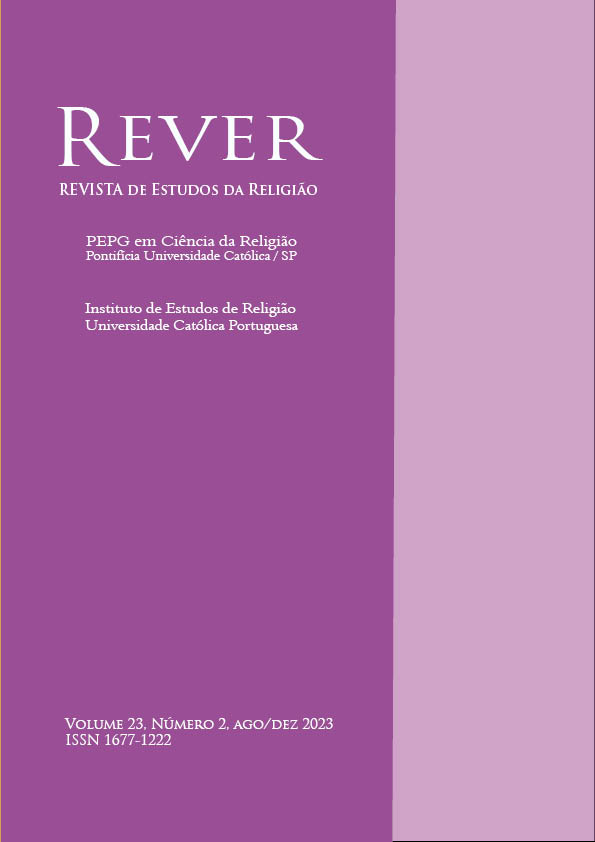Bens de salvação e mercados religiosos
Integrando a escolha racional e as perspectivas weberianas
DOI:
https://doi.org/10.23925/1677-1222.2023vol23i2a17Palavras-chave:
poder, escolha racional, campo religioso, bens religiosos, mercados religiososResumo
Apesar do enorme sucesso do conceito de "mercados religiosos", ainda não está claro o que são "bens religiosos", e sob quais condições um "mercado religioso" de fato existe em uma determinada sociedade. O autor integra diferentes conceitos dos teóricos da escolha racional e de Max Weber em uma nova tipologia de bens religiosos individuais e sociais. A tipologia mostra que os mercados são apenas uma possibilidade entre tantas outras de produção, troca e alocação de bens religiosos. Além disso, ela ajuda a entender as condições em que os mercados podem ou não ser ferramentas teóricas importantes.
Referências
AMMERMAN, Nancy Tatom. Religious Choice and Religious Vitality: The Market and Beyond. In: Lawrence A. Young (ed.) Rational Choice Theory and Religion: Summary and Assessment. New York: Routledge, pp. 119-132, 1997.
BECKER, Gary. The Economic Approach to Human Behavior. Chicago: The University of Chicago Press, 1976.
BOUDON, Raymond. L’Ethique protestante de Max Weber: le bilan de la discussion. In: Raymond Boudon (ed.) Etudes sur les sociologues classiques. Paris: Presses Universitaires de France, pp. 55-92, 1998.
BOURDIEU, Pierre. Genèse et structure du champ religieux. Revue française de sociologie 12, pp. 295-334, 1971.
BRUCE, Steve. Choice and Religion: A Critique of Rational Choice Theory. Oxford: Oxford University Press, 1999.
CHAVES, Mark. On the Rational Choice Approach to Religion. Journal for the Scientific Study of Religion 34(1), pp. 98-104, 1995.
COLEMAN, James S. Foundations of Social Theory. Cambridge, MA: The Belknap Press of Harvard University Press, 1990.
COLLINS, Randall. Stark and Bainbridge, Durkheim and Weber: Theoretical Comparisons. In: Lawrence A. Young (ed.) Rational Choice Theory and Religion: Summary and Assessment. New York: Routledge, pp. 161-180, 1997.
ELSTER, Jon. Introduction. In: Jon Elster (ed.) Rational Choice. Oxford: Basil Blackwell, pp. 1-33, 1986.
ESSER, Hartmut. Why are Bridge Hypotheses Necessary? In: Hans-Pete Blossfeld and Gerald Prein (eds) Rational Choice Theory and Large-Scale Data Analysis. Boulder, CO: Westview Press, pp. 94-111, 1998.
ESSER, Hartmut. Soziologie: Spezielle Grundlagen, vol. 1: Situationslogik und Handeln. Frankfurt: Campus, 1999.
ESSER, Hartmut. Soziologie: Spezielle Grundlagen, vol. 2: Die Konstruktion der Gesellschaft. Frankfurt: Campus, 2000a.
ESSER, Hartmut. Soziologie: Spezielle Grundlagen, vol. 3: Soziales Handeln. Frankfurt: Campus, 2000b.
ESSER, Hartmut. Soziologie: Spezielle Grundlagen, vol. 4: Opportunitäten und Restriktionen. Frankfurt: Campus, 2000c.
HAMILTON, Malcolm. Religion and Rational Choice. In: Malcolm Hamilton (ed.) The Sociology of Religion: Theoretical and Comparative Perspectives, (2nd edn). London: Routledge, pp. 215-228, 2001.
IANNACCONE, Laurence R. Religious Practice: A Human Capital Approach. Journal for the Scientific Study of Religion 29(3), pp. 297-314, 1990.
IANNACCONE, Laurence R. The Consequences of Religious Market Structure: Adam Smith and the Economics of Religion. Rationality and Society 3(2), pp. 156-177, 1991.
IANNACCONE, Laurence R. Religious Markets and the Economics of Religion. Social Compass 39(1), pp. 123-131, 1992.
IANNACCONE, Laurence R. Why Strict Churches Are Strong. American Journal of Sociology 99(5), pp. 1180-1211, 1994.
IANNACCONE, Laurence R. Voodoo Economics? Reviewing the Rational Choice Approach to Religion. Journal for the Scientific Study of Religion 34(1), pp. 76-89, 1995.
LECHNER, Frank J. Secularization in the Netherlands? Journal for the Scientific Study of Religion 35(3), pp. 252-264, 1996.
LINDENBERG, Siegwart. Social Production Functions, Deficits, and Social Revolutions: Prerevolutionary France and Russia. Rationality and Society 1(1), pp. 51-77, 1989.
LINDENBERG, Siegwart. Rationalität und Kultur: Die verhaltenstheoretische Basis des Einflusses von Kultur auf Transaktionen. In: Hans Haferkamp (ed.) Sozialstruktur und Kultur. Frankfurt am Main: Suhrkamp, pp. 249-287, 1990.
LINDENBERG, Siegwart. The Extension of Rationality: Framing Versus Cognitive Rationality. In: Jean Baechler, François Chazel and Ramine Kamrane (eds) L’acteur et ses raisons: Mélanges en l’honneur de Raymond Boudon. Paris: Presses Universitaires de France, pp. 168-204, 2000.
OLSON, Mancur. The Logic of Collective Action: Public Goods and the Theory of Groups. Cambridge, MA: Harvard University Press, 1977.
SCHLUCHTER, Wolfgang. Religion und Lebensführung, vol. 2: Studien zu Max Webers Religions-und Herrschaftssoziologie. Frankfurt am Main: Suhrkamp, 1991.
STARK, Rodney. Micro Foundations of Religion: A Revised Theory. Sociological Theory 17(3), pp. 264-289, 1999.
STARK, Rodney and Bainbridge, William Sims. Towards a Theory of Religion: Religious Commitment. Journal for the Scientific Study of Religion 19, pp. 114-128, 1980.
STARK, Rodney and Bainbridge, William Sims. The Future of Religion. Berkeley: University of California Press, 1985.
STARK, Rodney and Bainbridge, William Sims. A Theory of Religion. New York: Peter Lang, 1989.
STARK, Rodney and Iannaccone, Laurence, R. A Supply-Side Reinterpretation of the Secularization of Europe. Journal for the Scientific Study of Religion 33(3), pp. 230-252, 1994.
STOLZ, Jörg. Secularization theory and rational choice. An integration of micro- and macro-theories of secularization using the exemple of Switzerland. In: Pollack, Detlef and Olson, Daniel V.A. (ed.) The Role of Religion in Modern Societies. New York: Routledge, pp. 249-270, 2007.
TYRELL, Hartmann. ‘Das Religiöse’. In: Max Webers Religionssoziologie. Saeculum 43, pp. 172-230, 1992.
WEBER, Max. Economy and Society: An Outline of Interpretive Sociology. Berkeley: University of California Press, 1978.
WEBER, Max. Gesammelte Aufsätze zur Religionssoziologie I. Tübingen: J.C.B. Mohr (Paul Siebeck), 1988.
WEBER, Max. Wirtschaft und Gesellschaft. Tübingen: J.C.B. Mohr, 1985.
Downloads
Publicado
Como Citar
Edição
Seção
Licença

Este trabalho está licenciado sob uma licença Creative Commons Attribution-NonCommercial 4.0 International License.
Autores que publicam nesta revista concordam com os seguintes termos:
- Autores mantém os direitos autorais e concedem à revista o direito de primeira publicação, com o trabalho simultaneamente licenciado sob a Licença Attribution-NonCommercial 4.0 International, que permite o compartilhamento do trabalho com reconhecimento da autoria e publicação inicial nesta revista.
- Autores têm autorização para assumir contratos adicionais separadamente, para distribuição não exclusiva da versão do trabalho publicada nesta revista (ex.: publicar em repositório institucional ou como capítulo de livro), com reconhecimento de autoria e publicação inicial nesta revista.


